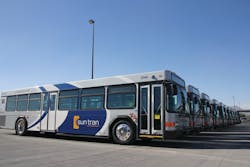Sun Tran Focuses on Air Quality with 47 New Buses
Sun Tran has placed 47 new alternatively fueled buses into service in the last six months. Ten utilize hybrid electric technology and the remaining 37 run on B5 biodiesel, a clean burning alternative fuel. These new buses replace almost 19 percent of the fleet and will be used throughout the system on regular fixed routes.
The purchase of buses using cleaner-burning fuels meets the livability goals of the city of Tucson by helping improve air quality in the region. Living in a healthy environment is an important element of a sustainable community.
Sun Tran’s buses with hybrid electric technology produce lower hydrocarbon and carbon monoxide emissions, which lowers particulate emissions by up to 90 percent, nitrogen oxide emissions by up to 50 percent and greenhouse gas emissions by more than 25 percent. Buses with hybrid electric technology utilize electric power, a combination of a biodiesel engine and electric power, or merely biodiesel engine power depending on the speed of travel. Additionally, the regenerative braking system captures energy when the brakes are applied, and stores it in the Energy Storage System (ESS). These buses offer low emissions, with the power, range and convenient fueling of conventional fuel-powered vehicles.
Currently three-quarters of Sun Tran’s fleet exclusively utilizes biodiesel fuel, which is a domestically produced, renewable fuel that can be manufactured from vegetable oils, animal fats, or recycled restaurant greases. Biodiesel fueled buses also emit significantly fewer particulates than traditional diesel-fueled vehicles, while lessening our dependence on foreign oil and conserving finite oil resources. The 57 buses purchased since 2010 are equipped with selective catalytic reduction technology that utilizes a urea solution injected into the exhaust gases to meet tighter Environmental Protection Agency emissions standards for nitrogen oxides.
Manufactured by Gillig Corporation of Hayward, California, these buses have replaced 15 year-old vehicles in Sun Tran’s fleet, decreasing the average age of the fleet from 6.82 to 4.65 years.
“This investment demonstrates Sun Tran’s strong commitment to our community’s sustainability,” said Kate Riley, Sun Tran general manager. “With one in five buses replaced, passengers enjoy new, more reliable, environmentally friendly buses — it gives people another reason to try Sun Tran and help reduce our carbon footprint.”
All of the replacement buses are low-floor, offering ramps and kneeling features for the convenient boarding of passengers with disabilities, as well as an on-board camera system for added passenger safety.
Purchased with funding from the Regional Transportation Authority, Federal Transportation Administration and the city of Tucson, the biodiesel buses cost just over $410,000 each, while the hybrid vehicles cost just under $610,000. Approximately half of the increased cost for the hybrid vehicles will be recouped through reduced fuel consumption over the life of the bus.
Sun Tran and the city of Tucson began experimenting with alternative fuels more than two decades ago. As early as 1987, Sun Tran converted a GMC bus to use both compressed natural gas (CNG) and diesel fuel. This was one of the first such buses in the country. Over the years Sun Tran continually increased the number of buses in the fleet utilizing cleaner burning fuels, and by 1997, approximately half the fleet used CNG. In 2005, biodiesel fuel was introduced, and in 2006 Sun Tran’s entire fleet utilized only these cleaner burning fuels. Sun Tran reached another milestone in 2010 with the purchase of the first hybrid electric vehicle in the fleet.
Since 2006, 100 percent of Sun Tran’s fleet has utilized clean fuel technology. The current breakdown of Sun Tran’s fleet and which fuel type each bus is using consists of the following: 197 B5 biodiesel; 45 Compressed Natural Gas; and 11 hybrid-electric/biodiesel.
